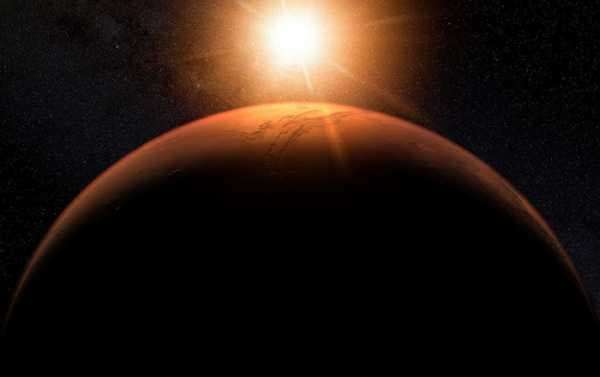
A photograph previously captured by NASA’s Opportunity rover on Mars has been transformed into a two-minute musical composition by UK scientists using a technique called data sonification.
Researchers Domenico Vicinanza and Genevieve Williams, of the UK’s Anglia Ruskin University and the University of Exeter, respectively, created the composition by scanning the picture from left to right and then assigning a pitch and melody to each pixel.
The image was snapped earlier this year on February 15, 2018, as the rover traversed the western edge of Mars’ Endeavor Crater. “We looked at all the bumps and all the terrain characteristics, and we mapped that to sound waves. It’s basically like jumping on top of Opportunity and taking a tour of the region,” Vicinanza told Space.com.
According to a release from Anglia Ruskin University, quiet and slow harmonies were the result of the darker portions of the photograph, while higher pitched sounds came from brighter portions, such as the sun’s disk.
“We are absolutely thrilled about presenting this work about such a fascinating planet,” Vicinanza said in a statement. “Image sonification is a really flexible technique to explore science, and it can be used in several domains, from studying certain characteristics of planet surfaces and atmospheres, to analysing weather changes or detecting volcanic eruptions.”
“In health science, it can provide scientists with new methods to analyse the occurrence of certain shapes and colours, which is particularly useful in image diagnostics,” he added.
The image used in this experiment was one of the last to be transmitted back to Earth before the rover went silent in June, when a dust storm cut off its solar power, according to Space.com, which later noted that seasonal winds known as Mars’ “dust devils” could clear off the blocked solar panels and allow for a reconnection.
Though the video was initially released on November 7 on YouTube, it wasn’t until Tuesday that the pair of researchers premiered their musical creation at the Supercomputing SC18 Conference in Dallas, Texas.
According to Anglia’s press release, officials used “both conventional speakers and vibrational transducers so the audience could feel the vibrations with their hands.”
The creative result came as NASA announced this week that it will be livestreaming the Mars landing of its InSight spacecraft on November 26. According to the US space agency, viewers will be granted an “uninterrupted, clean feed from cameras inside JPL Mission Control, with mission audio only.” InSight, which was launched earlier this year in May, is a robotic lander designed to study the inner workings of the mysterious Red Planet.
Sourse: sputniknews.com






